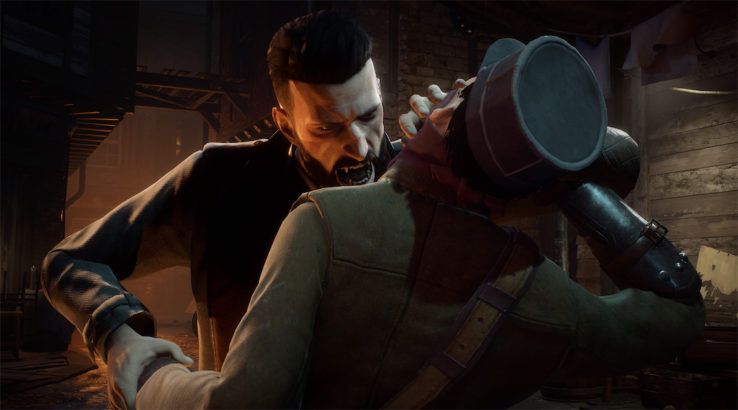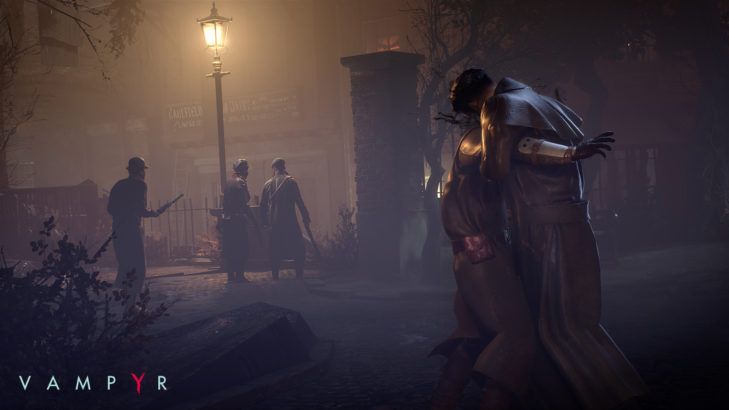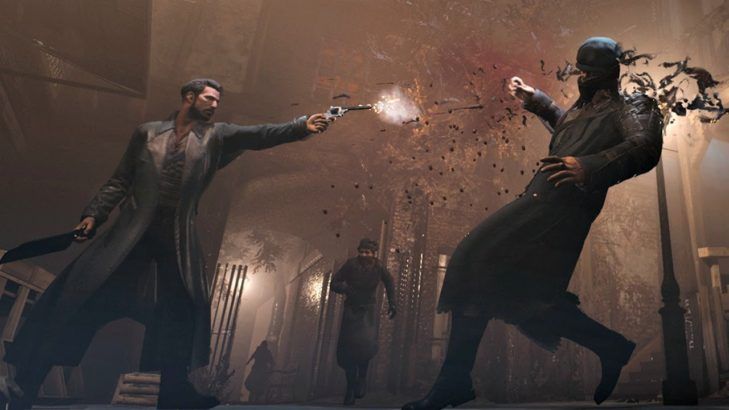With Vampyr, Life is Strange studio Dontnod Entertainment tries its hand at a horror-themed action RPG. The game's atmospheric trailers have turned heads, and it has been considered one of the most anticipated horror games of the year. Unfortunately for horror fans looking for a new high quality vampire experience, though, they're better off returning to games like Legacy of Kain: Soul Reaver and Vampire: The Masquerade - Bloodlines.
While it has many problems, Vampyr's biggest sin is by far its poor technical performance. On Xbox One, we ran into a multitude of issues, including frequent freezing, stuttering, and slowdown. Many textures in the game take some time to appear, especially when examining objects in the environment or reading notes. Glitches aren't uncommon either, like enemies getting trapped in walls and other parts of the environment.
To make matters worse, load times are way too long, and can become frustrating during particularly challenging boss fights where players will have to sit through a lengthy loading screen after each defeat. The game also likes to rip control from the player for sudden and unexpected loading while moving through the game world, and there is even some brief loading before starting conversations with NPCs.
However, it's worth pointing out that these technical issues and frequent, lengthy load times may be unique to Vampyr on Xbox One. We didn't have the opportunity to test other versions of the game, but reports online seem to suggest that it does run better on PC and PS4. If the technical problems are indeed improved on PC and PS4, then Vampyr is a little easier to recommend, but it has other issues that should be present in all versions of the game to keep in mind as well.
Besides its many technical issues, Vampyr is also brought down by its dull, uninspired combat. Combat mainly consists of hitting enemies over the head with clubs or slicing them with machetes, draining them of blood when given the opportunity, and dashing around to avoid taking damage. The vampire abilities are very underwhelming, especially in the early hours of the game, to the point that most of them are far less useful than just using standard melee weapons or guns.
The combat in Vampyr is too easy when facing regular enemies one-on-one to ever be interesting, and when there are multiple enemies in an area, the combat is too difficult for the wrong reasons. These battles against multiple enemies at once are headache-inducing, as the camera likes to swing around frantically in an attempt to keep an eye on the action, and the lock-on feature tends to be unreliable. There were many instances where we had to push the right stick multiple times to get protagonist Dr. Jonathan Reid to focus on another enemy, breaking the flow of combat and leaving him open to cheap shots.
The only time the combat in Vampyr is ever really engaging is during one-on-one boss battles, but even then, the encounters are nothing to write home about. Vampyr's uninspired combat serves only to mess with the pacing of the story, partially ruining the main reason to play the game, and unfortunately, it's not the only thing that causes pacing issues.
Progressing through the main story in Vampyr feels like a chore for reasons beyond the dull combat. Navigating through the maze-like streets of London can be tiresome, especially since the compass at the top of the screen does an awful job of leading players in the right direction. We found ourselves constantly referring to the map to reach certain objectives, which wouldn't be a big deal, except we experienced a slight freeze every single time we opened it. Like the load times and the boring stretches of combat, getting lost in London kept us from experiencing the things Vampyr actually does really well.
And make no mistake about it, Vampyr does do some things really well. Developer Dontnod Entertainment has been praised for its storytelling abilities in past games like Remember Me and Life is Strange, and that talent is on fully display here. Vampyr successfully transports players to a Gothic horror take on 1918 London, with the game set during the height of the Spanish flu epidemic. Dr. Jonathan Reid serves as an interesting protagonist, especially when the game explores how his new blood lust contradicts his firmly-rooted desire to save lives with his medical expertise.
Players who are able to force themselves through the bland combat and exploration will likely become invested in not only Dr. Reid's story, but the stories of those around him. Vampyr features a game world populated by unique NPCs who all have their own backstories, desires, and flaws. Dr. Reid can investigate these characters, sometimes completing side quests for them, to learn more about their lives and ultimately decide whether he should spare them or feed on them for a big XP bonus.
Killing characters has a big impact on the game world, and engaging with this feature is when Vampyr is at its best. Player choice truly matters, shaping both Dr. Reid's personality and the world around him. Our only gripe when it comes to this aspect of the game is that some dialogue choices are lacking, being restrictive to the point where players are sometimes presented with three options that basically amount to the same thing. This prevents players from having complete control over Dr. Reid and his personality, but it's a minor complaint overall.
Vampyr is at its best when players are digging into the lives of London's citizens and choosing who to kill or who to spare, so it's unfortunate that the developers felt the need to shoehorn in uninspired combat and frustrating exploration elements. Beneath these problems is a classic vampire story that leverages its grim visuals and moody soundtrack to create an engrossing atmosphere, but the many technical issues still make Vampyr hard to recommend, even for diehard fans of the genre.
Vampyr is out now for PC, PS4, and Xbox One. Game Rant reviewed the game on Xbox One.




